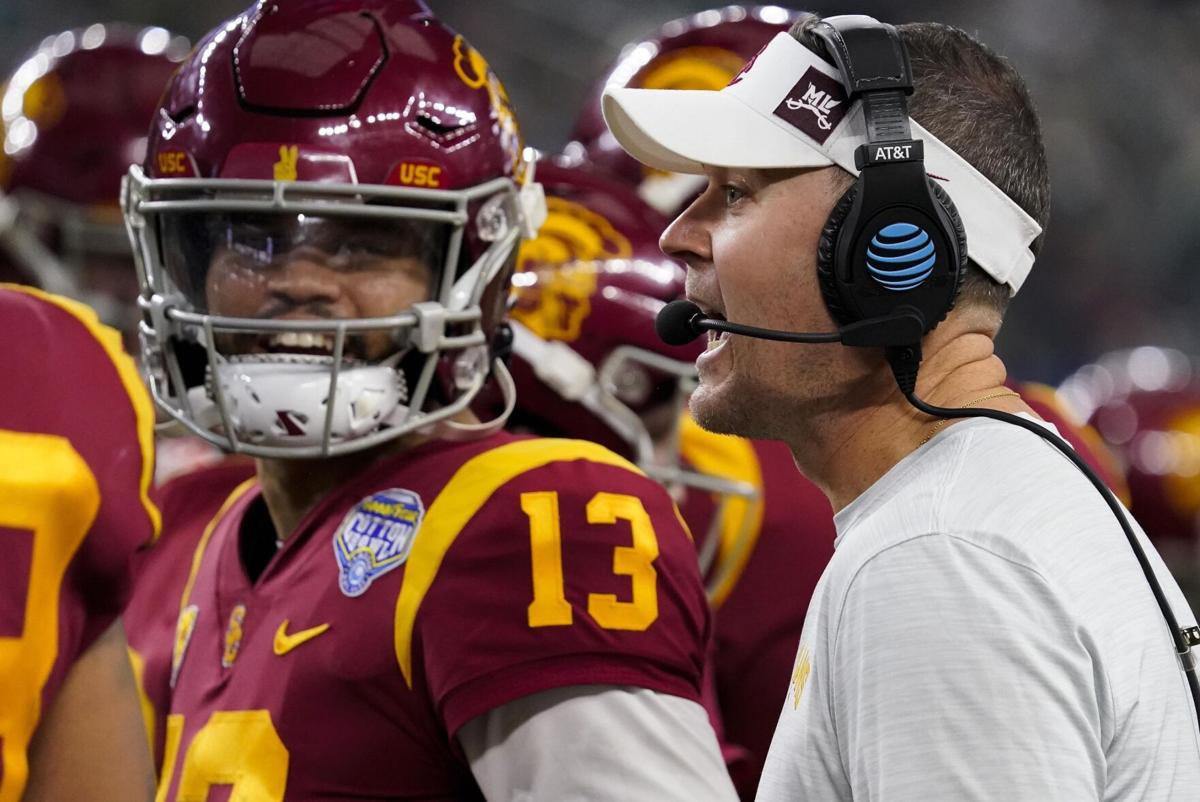The most anticipated Pac-12 football season in recent memory begins Friday (unofficially, at least) with the annual media showcase.
Here are five storylines to watch in Las Vegas.
1. The main event
We know what commissioner George Kliavkoff won’t say during his state-of-the-conference address. He won’t say the Pac-12 has signed a media rights deal and secured its future. That colossal issue has not yet been resolved (and could take another month, at least).
Instead, Kliavkoff will focus on the upcoming football season and the star-studded lineup of players and coaches in attendance on Friday.
That won’t be easy.
The question-and-answer session with the media that follows his opening remarks undoubtedly will focus on the contract saga and the potential for schools to leave for the Big 12.
Kliavkoff hasn’t commented publicly on the negotiations since December and has never provided a timeline for resolution.
Will he offer any details? A series of non-answers would merely generate more questions, suck attention away from the season and prompt media members to ask the very same questions of the coaches, whose sole purpose Friday is to promote their teams, not discuss media rights.
2. The absent headliner
Colorado coach Deion Sanders was scheduled to take the stage approximately seven hours after Kliavkoff’s address but announced on Wednesday that he won’t attend the event.
The high-profile coach must undergo a medical procedure this week, leaving defensive coordinator Charles Kelly to represent the Buffaloes in Las Vegas. (Quarterback Shedeur Sanders, the son of the head coach, is expected to attend.)

Coach Prime won't be at the Pac-12 media day due to a medical procedure.
First, we wish Sanders the best in his ongoing battle with blood clots in his legs.
Second, his absence strips the event of what would have been the marquee attraction: Sanders’ question-and-answer session with the media.
3. The outgoing schools
Thanks largely to the ongoing media negotiations, one topic of discussion might not receive quite the same level of interest it otherwise would: The final season in the conference for USC and UCLA.
That’s probably fine with Lincoln Riley and Chip Kelly, who would much prefer to focus on their 2023 seasons and not the 2024 move to the Big Ten.
Both coaches have reason for optimism this fall, especially Riley, whose Heisman Trophy-winning quarterback, Caleb Williams, will take his turn on the main stage at roughly 9:45 a.m.
Nobody associated with either school will escape the symbolism of the Pac-12 moving the event to Las Vegas for the first time — away from its longtime home in Los Angeles.
4. The quarterback Q&As
In case Kliavkoff’s remarks and the L.A. defectors don’t provide enough narratives, the nine-hour event also will feature the strongest lineup of quarterbacks in the Power Five this season.
We’re curious about Williams’ mindset as he attempts to become the first back-to-back Heisman winner since Archie Griffin in the 1970s.
What will Utah’s Cameron Rising disclose about his recovery from a knee injury (in the Rose Bowl) and status for the crucial season opener against Florida?
How does Washington’s Michael Penix Jr. plan to manage soaring expectations and build on the Huskies’ 11-win season?
What insight will Oregon’s Bo Nix offer about his decision to return to Eugene for the 2023 season and the Ducks’ road to reclaiming dominance?
But the most interesting quarterback Q&A of all will feature the starter from a team that won just five games last season: Arizona’s Jayden de Laura.
The junior undoubtedly will face questions about his off-the-field conduct, specifically the settlement of a sexual assault case that occurred when he was in high school and resulted in second-degree charges, according to Tucson.com.
How de Laura handles the pointed questions — with candor and accountability or a stone face and non-answers — will lend insight into his maturity level and leadership qualities.
5. In the shadows ...
We aren’t suggesting Washington, WSU, Oregon and OSU will be relegated to a secondary role during the day-long proceedings.
But because of the media glare directed elsewhere, the Pacific Northwest schools (combined record last season: 38-14) could command only a fraction of the attention they would receive under other circumstances.
It’s a fascinating role reversal, especially for Oregon.
And it speaks to the unprecedented array of storylines offered by the conference entering a season like no other.
Salpointe five-star DE Elijah Rushing announces his commitment July 6, 2023, to play college football beginning in 2024 for the hometown Arizona Wildcats. By some current metrics, Rushing is the highest-rated recruit in Arizona high school history. Video by Michael Lev/Arizona Daily Star






